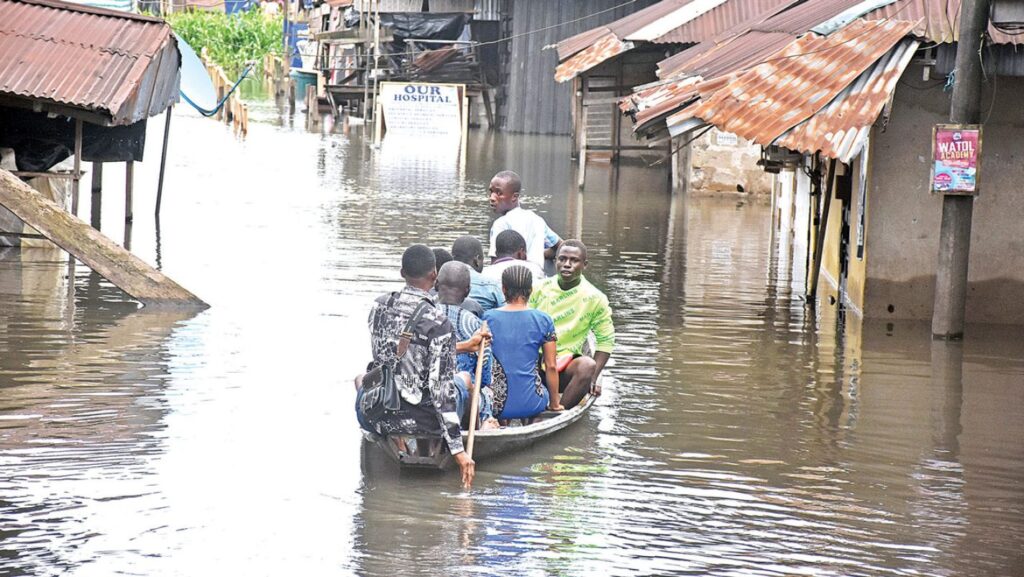• WaterAid warns of disease outbreak
Environmental engineers have advised the Federal Government to implement the $1.9 trillion Energy Transition Plan (ETP) to address climate change and other environmental hazards currently ravaging the country.
They gave the advice, yesterday, at the 2022 conference/yearly general meeting of the Nigerian Institution of Environmental Engineers (NIEE), Lagos chapter in Ikeja. The event has “Understanding Nigeria’s Energy Transition Plan (ETP)” as its theme.
NIEE National Chairman, Sesan Odukoya, said ferocity of the current flooding that has so far claimed at least 600 lives and several properties worth billions of naira was helped by the non-implementation of the action plan at the opportune time.
He said several reports were done in the past proposing solutions to global warming and its devastating effects, yet government did nothing about them.
Odukoya recollected that there were proposals for three dams in the country as well as building of barrier walls to avert climate change hazards and provide jobs. None of these, he regrettably added, was done by government.
Chairman, NIEE, Lagos State chapter, Mrs. Abiola Kosegbe, said the desertification in the North, flooding in parts of Nigeria as well as air pollution and coastal erosion, which have resulted in socioeconomic effects, are all indicators of the truth and serious effects of climate change in the country that require swift action to mitigate its effects.
She said to guarantee better living condition for millions of Nigerians, urgent development was required in light of the country’s rapidly increasing population.
Kosegbe stated that a truly equitable transition was achievable in Africa’s largest economy through combination of economic development and climate action over the next two decades.
Chairman, Steering Committee, Nigeria’s Renewable Energy and Energy Efficiency Associations Alliance (REEEAA), Prof. Magnus Onuoha, said there were warnings of climate change, which the country is now witnessing via flooding and overflowing of dams and rivers.
Onuoha, who is President, Sustainable Energy Practitioners Association Nigeria (SEPAN), insisted that Nigeria must put in place measures to address greenhouse gas and carbon emissions to check flooding.
BESIDES, WaterAid Nigeria has warned that the recent flood disaster in the country might lead to disease outbreak.
The Acting Country Director, Abu Jibril, who gave the warning in a statement, yesterday, in Abuja, stated that with 38 million people still defecating in the open, the act could raise the risk spread of disease in communities.
His words: “The flooding has increased the risk for communities in flood prone regions, in a country where an estimated 38 million people are still forced to defecate in the open, and tens of millions more have very limited access to other forms of sanitation. When the water comes like it has now, washing away human waste, it raises the risk of disease outbreaks that could further cost lives and impoverish citizens.”
He stressed the need for government to act fast to avoid pandemics
Jibril expressed worry that the displaced people need not only food and shelter, but also access to safe water, sanitation and hygiene.
But sadly, he noted, s many displaced persons do not have access to safe water and good sanitation, with women and children most vulnerable and worst affected.
He said added: “A decent toilet and a bar of soap can literally save lives now, as they prevent diseases from breaking out.
“With climate change upon us, many people in Nigeria are already living on the frontline of the crisis – and it’s likely to get worse. The Nigerian government has started a campaign to stop people from defecating in the open, but we also need support from international governments and donors to ensure communities, who did the least to cause this crisis, are able to adapt to the changing circumstances and build resilience against future shocks.”
Source: Guardian.ng

